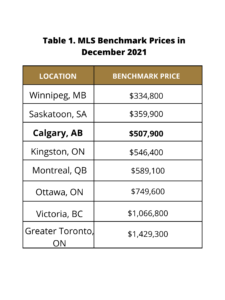There is an age-old saying that applies to investments: buy low, sell high. And there is no doubt that housing has become an investment in the minds of many. Calgary, the third largest city in Canada behind Toronto and Montreal, is the cheapest of the large metropolitan areas for housing. Does this alone make it primed for investors to start snapping up real estate?
Not necessarily. Let’s explores some of the factors influencing investment in Calgary real estate.

But first, let’s address your shock that Vancouver is not bigger than Calgary. I assure you this is not a typo. The city of Vancouver is actually quite small at 631,486 people. It is the Metro Vancouver area that is large at 2,463,431 residents, only falling behind the Greater Toronto Area (GTA) or Montreal for population size.
In 2021, some unanticipated changes occurred to the national real estate picture. Driven by factors related to COVID, people moved in unprecedented numbers to smaller locations that don’t have big economic engines and whose populations had been stagnant for decades, such as Atlantic Canada. Case in point, in 2021, New Brunswick saw price growth above 30% year-over-year, and the Greater Moncton area was even higher. Compare that to the mid-to-high single digit price increases in Alberta in 2021, explored in more detail shortly.
These changes were driven by the new social demands and opportunities placed on people during the pandemic: the ability to work remotely; the desire for bigger homes and yards due to lockdowns; the wish for separate home office space; the requirement to home-school children; and the wish to co-reside with Baby Boomer parents who now want to age-in-place. We also know that international immigration picked up again last year after harsh pandemic-related restrictions in 2020.
According to Canadian Real Estate Association (CREA) data released in December 2021, Calgary is one of the few areas across the country that had greater sales activity in November 2021 than the GTA or Montreal. However, the MLS Home Price Index shows that the composite price for all properties in Calgary has remained relatively flat since the housing market crash in 2007.In terms of actual price, in August 2007 the benchmark price (a “typical” home based on the features of homes that have been bought and sold previously) was $418,500. As of December 2021 (14 years later) the price has only risen to $451,200. Nonetheless, single-family home prices over the same time period did increase, from $443,100 in August 2007 to $507,900 by December 2021. This means that condos and townhouses are dragging down the composite price in Calgary.

Single family home prices in Calgary hit a recent bottom of $440,000 in April 2020, so there has been a $67,000 increase in price during the afore-mentioned pandemic related buying spree. Further, the average home price nationally was $720,850 in November 2021, an increase of over 19% year-over-year. Even when we remove the GTA and Metro Vancouver from the average price, we are still left with a national average of $562,850.
If Calgary is a solid $55,000 cheaper than the average home price across this country, the math seems simple and for some, enough reason to buy in Calgary. Who might want or need to save $55,000 on a home purchase? Conversely, who might be trying to dodge a market that has seen increases of 25-30%, as many markets in Canada witnessed in 2021? If you are a young, first-time home-buyer facing the stress-test, having to save up a down payment of 20% to avoid the Canada Mortgage and Housing Corporation insurance fees, you can work from anywhere, and you’re in a race against increasing interest rates forecasted for 2022, Calgary seems like a very appealing housing market, doesn’t it? Particularly when even Newfoundland’s home prices rose at a greater rate than Alberta’s last year. For comparison, Table 1 shows the benchmark price for a single-family home in some of Canada’s cities in December 2021.

Alberta has no restrictions on who can purchase property in the province, except for the Canmore adjacent communities of Deadman’s Flats, Harvie Heights, and Exshaw. If you can’t afford to buy in Canmore itself, well, Calgary is only one hour away.
A report from a Chinese “real estate portal that connects Chinese buyers with international listings” indicates that in 2018, “interest by Chinese buyers in properties in Calgary increased by 234.4%. In contrast, inquiries into Toronto decreased by 10.3%, and Vancouver decreased by 2.8%” when compared to 2017.
You might not be a data-driven geek, but you still might wonder what is happening to the prices in the Calgary real estate market, and why. After almost two years of pandemic lock-downs, with the vaccine rollout, students from other countries are likely returning to live near campus. For example, “Sotheby’s International Realty found that 41% of Chinese buyers look to Toronto real estate for educational purposes.”
Further, Calgary is noted by the moving company U-Haul to have done a great job marketing itself, and in general, the city is diversifying its workforce and economy by focusing on attracting information technology and film industry dollars. Further, international immigration made up almost half of the recent population growth in Alberta. These folks often rent at first, but a tightening rental market will attract speculative investment as well.
It’s all inter-connected. Shaun Cathcart, CREA’s Senior Economist cautions, “Housing cycles can be very long.”
Is Calgary’s housing cycle changing due to speculative investment? It certainly seems primed to do so.



